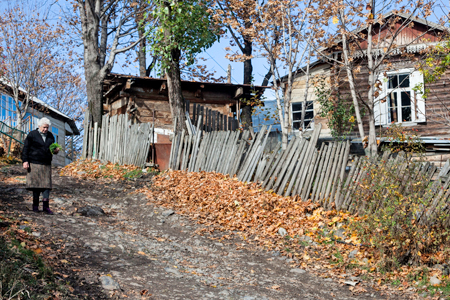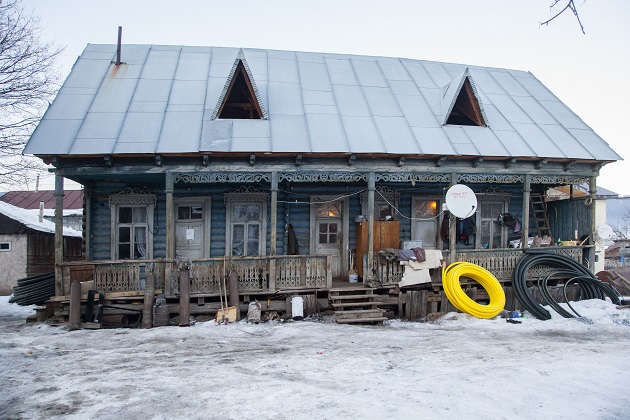Rural Development Strategy 2017-2020
Turning Georgia’s rural areas into modern villages


What can be done for Georgian villages to increase the quality of life for the rural population and ease access to much needed services? This is the main question and task of Georgia’s first national strategy for rural development which defines key agricultural development issues for 2017-2020.
The growth and diversification of local economies, the improvement of social and public services, the sustainable use of natural resources and local engagement in the development process are some of the main goals Georgia has set out to achieve during the next four years.
The Government of Georgia presented the Rural Development Strategy 2017-2020 on March 16; it was first adopted by the government back in December of 2016.
Drawing on standard EU practices and policies, the strategy presents a new approach to rural development in Georgia, focusing on the promotion of entrepreneurship and civil engagement.
Additionally, it will aim at improving quality of life in rural areas while paying special attention to the values of natural and cultural heritage.

The new strategy aims to increase the quality of life for the rural population. Photo by N. Alavidze/Agenda.ge.
A range of national and international parties - including civil society and community organisations, national and international experts, relevant ministries and state agencies - were all engaged in the development of the strategy.
Initiated by the Government of Georgia the Rural Development Strategy 2017-2020 was supported by the European Union (EU), two United Nations agencies (UNDP and the Food and Agriculture Organisation), under the EU-funded European Neighbourhood Programme for Agriculture and Rural Development (ENPARD).
What is a ‘modern’ village?
Georgia’s Prime Minister Giorgi Kvirikashvili believes that a modern village must be able to make use of its unique, rural qualities to the benefit of both visitors and locals, and to offer highways, train stations and airports.
A village can be called modern if it makes use of its agricultural potential and has well developed tourism and agricultural tourism. A modern village has greater access to higher quality education and healthcare, with the population engaged in sports, health, and cultural activities”, said Kvirikashvili.
We are building a modern village by adopting modern technology and establishing technological parks. A project of vital importance has been launched to ensure blanket high-speed internet connection, offering every village and household new opportunities and enriching them with greater knowledge and education”, he added.
The Head of Government claims human beings are the ultimate value cherished by the Government of Georgia, and both urban and rural residents must be able to enjoy the benefits offered by the state.

Georgia's Prime Minister Giorgi Kvirikashvili presented the Rural Development Strategy on March 16, 2017. Photo by the PM's press office.
Kvirikashvili remains hopeful that the implementation of the Rural Development Strategy will largely encourage the development of rural businesses, with new technology available in the villages and better access to services.
In this process, visa-free travel for Georgians to the Schengen Area of Europe will play an important role, the PM believes.
In a matter of days, every urban and rural resident will be able to enjoy the benefits of visa-free travel, which is another page in Georgia’s regional development. It is a new opportunity for small businesses across Georgia’s rural areas to establish ties with prospective European partners, participate in exhibitions, and learn about and use new possibilities offered by visa-free travel to every Georgian”, Kvirikashvili said.
Rural development strategy in details
The strategy includes several priority areas of which the first is a health economy and fair competition, which will be achieved in the following ways:
- Economic recovery of farming, restructuring and modernisation through the diversification and development of effective supply chains;
- Diversification of the rural economy through strengthening the agricultural related value chain and promoting various sustainable non-agricultural activities; and
- Development of tourism in rural areas, based on rural specificity and unique cultural identity.
Meanwhile, the strategy outlines the vision of how to improve social conditions and living standards in Georgia’s rural areas, which include:
- Raising awareness in innovation and entrepreneurship as well as promotion of cooperation through contributing to the skills development and employment issues (especially for young people and women);
- Improvement of basic rural infrastructure (including the roads leading to cultural heritage sites and other relevant infrastructure), and the availability of high-quality public services, including information and communication technologies; and
- Increase the involvement of rural population (especially youth and women) in the identification of local needs and the determination of solutions to these needs.

Improvement of basic rural infrastructure and the availability of high-quality public services is one of the main tasks of the strategy. Photo by N. Alavidze/Agenda.ge.
Another priority area of the strategy is environmental protection and sustainable management of natural resources. In this direction the following steps should be made:
- Improvement of the management of water, forest and other resources in targeted rural areas;
- Promotion of sustainable systems of waste management in rural areas; and
- Activities used to mitigate the negative impact of climate change, risks assessment.
Funding
The State Budget will be the main source of funding, while international and donor organisations will also be involved.
Funding of the projects initiated for rural development will also be provided by the agencies or/and funds implementing the projects under different agencies.
More than 300 million GEL (about $121m/€112m*) will be provided for by state funding for 2017 within the strategy.
Meanwhile, the ENPARD’s budget for 2013-2020 will be €179.5 million for Georgia’s rural development, of which €77.5 will be spent starting 2017.
After adopting the Rural Development Strategy 2017-2020 an Interagency Coordination Council on rural development was also established to coordinate the implementation of the strategy.
The Interagency Coordination Council under the guidance of the Ministry of Agriculture will coordinate the implementation of both the strategy and individual projects planned with the maximal engagement of the rural population.
* Currency conversions reflect National Bank of Georgia values as of today.
 Tweet
Tweet  Share
Share